iStudy for Success!
Online learning tutorials for essential college skills.
Source Evaluation and Search Strategies
iStudy would like to acknowledge Alice Whiteside for revising the content of this tutorial.
Purpose
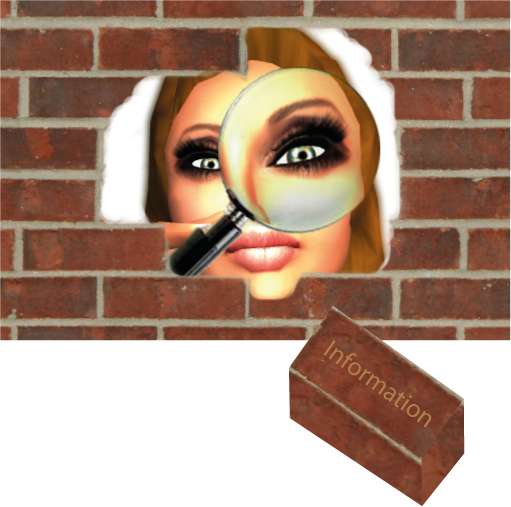 Many of us are inclined to accept all sources of information as valid and reliable. Some people would call this being gullible or easily swayed. Others would say that some kind of source evaluation is required before accepting premises or ideas. In college, as well as work and "real life," some sources are more appropriate than others.
Many of us are inclined to accept all sources of information as valid and reliable. Some people would call this being gullible or easily swayed. Others would say that some kind of source evaluation is required before accepting premises or ideas. In college, as well as work and "real life," some sources are more appropriate than others.
Writing a research paper is an example of a time when the use of the appropriate sources is important. To excel in an academic environment, you must learn how to locate and properly evaluate information and data that you have collected while conducting literature reviews, interviews, or doing other forms of research.
This tutorial will help you to understand basic concepts related to locating and evaluating information. By explaining the different types of sources and the criteria for determining the quality of a source, you will be better prepared to conduct a college-level literature review.
Goals and Objectives
By the time you finish this tutorial, you will be able to:
- Identify different types of sources and their appropriateness.
- Use search strategies to locate information/sources.
- Apply questions to help evaluate sources.
- Apply criteria and establish the quality of sources.
Activities
- Read the information about source evaluation and search strategies.
- Activity 1: Finding Information
- Read the information about making good use of resources for fiding sources.
- Activity 2: Searching Strategies
- Read the information about refining the source evaluation process.
- Activity 3: How to evaluate materials?
- Read the information about the tangled Web
- Activity 4: Practice of Source Evaluation
Note: All external links in this tutorial will open in a new window or tab.
References
Summary
Instructor's Guide
Source Evaluation and Search Strategies
General Source Evaluation
This tutorial will help you understand basic concepts related to locating and evaluating information for research projects. By exploring the different types of sources and the criteria and questions for determining the quality of a source, you will be better prepared to conduct a college-level research literature review.
In addition to a topic, the first thing you have to know is the kind of information you are seeking for your research project. Establishing clear objectives for your research process is paramount. For instance, are you interested in "just the facts?" In that case, you may be looking primarily for statistics. Or are you looking for rich descriptions or eyewitness accounts of events or experiences? These objectives will lead you in a different direction from a statistical analysis of your topic.
Read the dialogue from a meeting of freshman virtual students to gain some hints on things to think about before you begin significant searching and source evaluation. These processes, along with a clear goal for your research, will help you filter the sources you uncover more easily, quickly, and efficiently.
Student Dialog - Source Evaluation
Brian: We've been working on things like time management, stress management, listening skills, and note taking skills, but we haven't talked much about how to do research for a paper. Have you had to write a research paper for any of your Penn State classes yet? Or do you have much experience from high school with writing papers?
Deena: That's a good question, Brian. I do have some experience with writing papers in high school, but that was so long ago! Things have changed a lot since then. I think some of the basic skills will still apply, but I don't know anything about how to evaluate information from the Internet, or even how to cite websites. And finding things at the library - that's still a mystery to me.
Brian: Yeah, there are so many resources at the library that sometimes I get so overwhelmed that I just give up! How can I find out what resources are available to use for finding information, and then, how can I learn to use them?
Deena: Have you tried asking the librarian for help? There are also some tutorials on the Web at the library website. Have you tried doing those? Or you could take one of the seminars the library offers to learn about the different resources.
Brian: My first-year seminar instructor did tell us about the tutorials and seminars, but I haven't taken time to do any of them yet. I know I need to do research and that there are a lot of resources available, but how do I know which resources to use and how do I get started?
Deena: First, I think you have to identify your topic. If you don't know what your topic is, you won't know which resources to use.
Brian: I have to write a paper for my freshman seminar about what it's like being a freshman in college and compare my experiences here at Penn State with what it would be like for a student at a small, private college.
Deena: Okay, it sounds like your topic could be summarized as the freshman college experience. You can use your own experiences to write about what it's like to be a student at Penn State. Now that we have a topic, we can develop steps for the research plan.
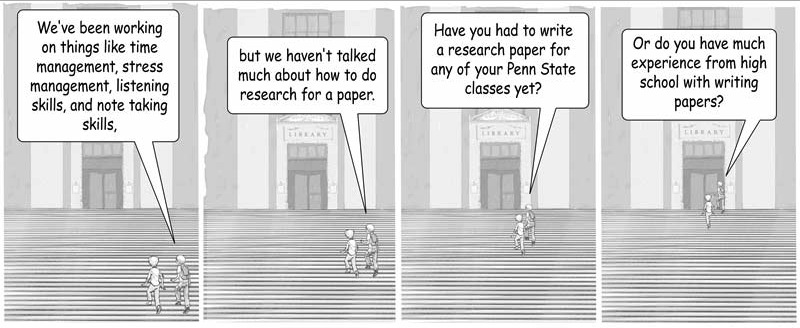
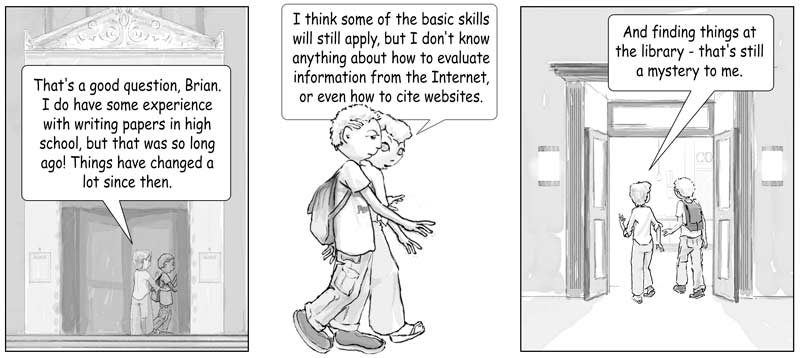
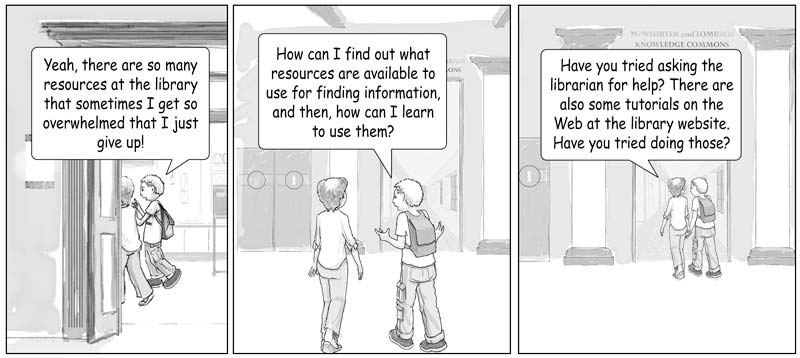
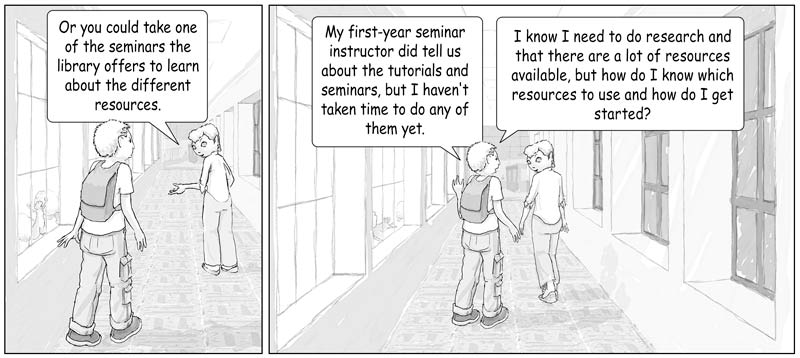
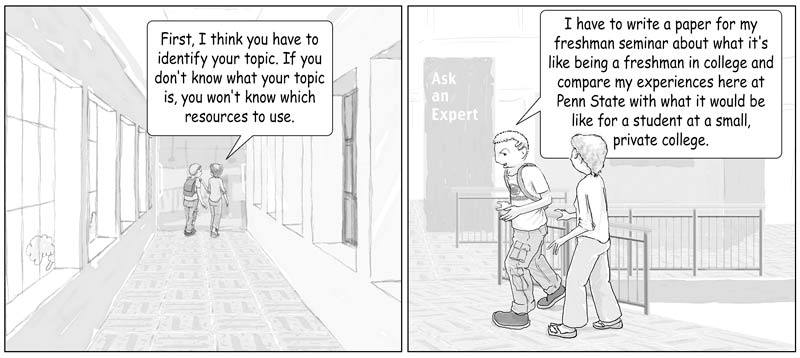
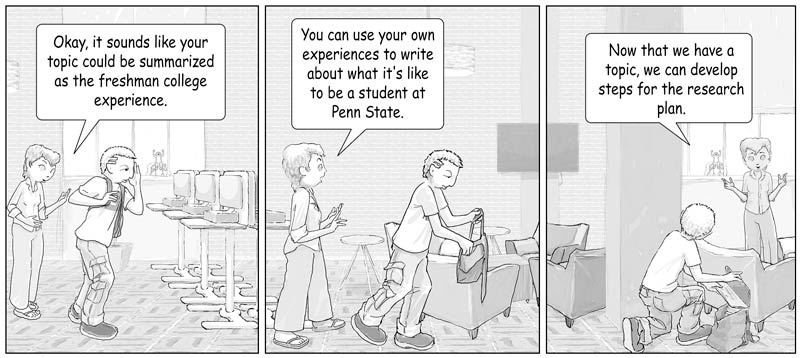
Tip: These tutorials will help you learn to use the online library catalog at Penn State.
https://libraries.psu.edu/guides/howto
[top of page]
Select a Topic
It's a good idea to think about your project before you do significant searching and source evaluation. Having a clear goal for your research will help you filter the sources you find more easily, quickly, and efficiently. Keep these three things in mind as you work on identifying your topic:
- If possible, pick a topic you will enjoy researching - something that will hold your interest.
- Be aware of size and scope. Complex or large subjects require more research time and result in longer papers.
- Keep in mind the length of the final product, difficulty of topic, and target date(s) - don't pick a topic so broad or involved that you won't be able to complete it within the time frame you have been given.
Then, as you think about your topic, ask yourself the following questions.
- Are you interested in just the facts (quantitative date)?
- Are you looking for rich descriptions or eyewitness accounts (qualitative data)?
- How do you think each of these objectives would affect your research?
Tip: To get started on a research project you need to state your topic and identify the types of information you are interested in finding. Try stating your topic in the form of a question or questions to help you focus your research.
[top of page]

Student Dialog - Search Strategies
Brian: So, if the topic is, "the freshman college experience," what kinds of information do I need to find?
Deena: Well, I would like to try to find some magazine articles that talk about sports and other activities at small private colleges. I think that will give me an idea of some of the things that are different about going to a large public university rather than a small private college. I would also be interested in finding blogs or articles written by students.
Brian: Okay. How should we do that? Go to the library and do some research?
Deena: No, I think we need to get some background information on the topic first. Otherwise, we'll just be stumbling around.
Brian: I think I need to know the names of some small private colleges and other information so I can focus my search.
Deena: Yeah. A lot of time would be wasted without first getting some background information. You need enough general information about the topic so you can decide where to focus your research. I think it would help if you wrote down a couple of questions you want to find the answers to before you start to search for information.
[top of page]
Finding Information
Your background search should provide you with a large number and variety of sources. Here are some tips to help you get started:
- Write down what you know about your subject.
- Try some searches in library resources and on the open web to get a sense of the amount of information available on your topic.
- Search in the library catalog (The CAT) for books, search article databases for scholarly journal articles, and look in encyclopedias for basic overviews or background information.
- Remember that bibliographies can often be found at the end of encyclopedia articles, and dictionaries are useful for unfamiliar terms.
- Make an outline to use as a road map. Maps and plans help you to determine if there is too much or too little information available on your topic.
- Check for significant names, dates, and terminology. Think about the "who, what, when, where" of your topic and maybe also the "how" and "why."
Tip: Try out different keywords and phrases as you search. Check your topic words against a thesaurus or subject-heading list to get additional ideas of words to use to search for resources.
[top of page]
The Preliminary Evaluation Process
As you start to research a topic, it is normal to make some more-or-less instant decisions about the value of the resources and materials you find. Here are some primary evaluation questions that you can use to determine whether the resources you found will be valuable to you or not. Much of this information can be obtained from bibliographic information, tables of contents, or citations you have found. Remember, at this point you are only trying to get an overview of the topic.
Currency
- Is the information current, especially if your topic is changing and developing rapidly (check the copyright date, publication date, or, for a website, the date the page was last updated)?
- Is it dated? Has it been updated?
- Is there more than one edition of a publication? Having more than one edition may indicate a standard and reliable source for this topic area.
Relevancy
- Is the information pertinent to your subject?
- What is the tone of the information source (scholarly, popular, or technical)?
Authority
- Are there any credentials listed for the author?
- Has your instructor mentioned this author?
- If a Website, is the content from a reliable source, such as a university or government agency?
- If a journal, has it been reviewed by peers in the discipline?
- If a book, is it scholarly in nature or part of the popular press?
- If a periodical, is it scholarly (i.e., Adult Education Quarterly), of substantive general interest (i.e., The Economist), a popular magazine (i.e., Ebony, Readers' Digest) or sensational (i.e., The National Enquirer) in nature?
Clarity
- Are there any readily apparent biases surrounding the work?
- Are there advertisements or sponsors?
- Is the publisher a university? A scholarly publishing house? The popular press?
Tip: Ask yourself what type of source will be the most useful and most credible for providing information on your particular research topic. With this question as an overarching framework, you will be able to make some preliminary decisions about what materials are scholarly, relevant, and reliable.
Activity 1: Finding Information
Complete this quiz to see what you have learned.

Make Good Use of Resources for Finding Sources
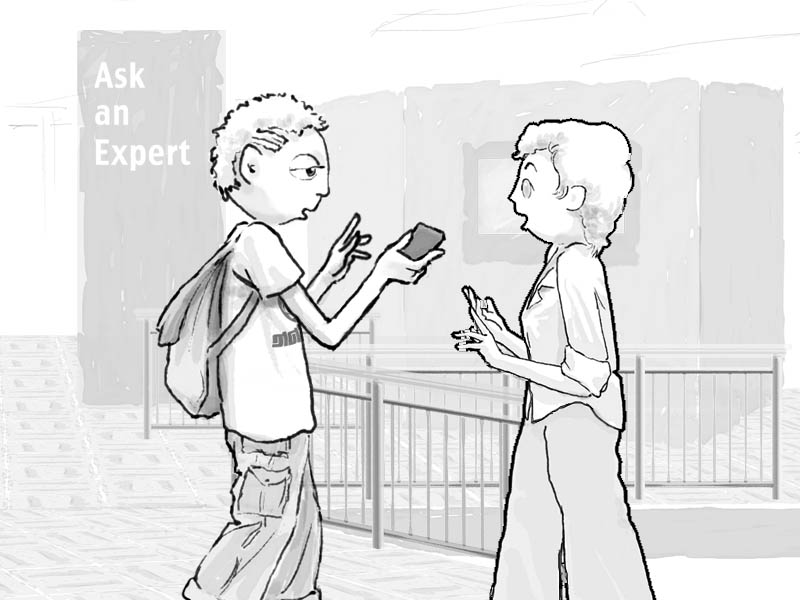 Brian: Okay. I understand that I need to start by writing down some questions I want to find answers to and by searching for background information. Then, I need to carefully evaluate the information I find to figure out if it will be good to use in my paper. But, I still don't understand how to start searching. How do I go about finding sources at the library?
Brian: Okay. I understand that I need to start by writing down some questions I want to find answers to and by searching for background information. Then, I need to carefully evaluate the information I find to figure out if it will be good to use in my paper. But, I still don't understand how to start searching. How do I go about finding sources at the library?
Deena: I think the best way to start is by identifying some keywords to use when searching the databases. If we know specific book titles or authors, we can search using those names too, but since we are only just starting to find information about this topic, keywords are probably the best way to get started.
Brian: So should I just go to the library and ask the librarian to help me?
Deena: That's a good idea. With the library, you primarily use databases and electronic indexes to find books and articles or connect to e-books or e-journals. There are a lot of different databases, and you have to know which index or database to search in. With the Web, you are searching more broadly so you can find information from anywhere. Sometimes this is useful, but sometimes it's harder to sift through your search results to get to the reliable sources. And the library's online resources don't show up in a Google search.
Brian: No matter which one we use, I think we still need to identify the keywords before we can get started.
Use of the Library
For the most part, you will be using databases and electronic indexes to find books and articles in the library, or you will be connecting to the library's online access facilities.
Tips:
- Identify key words and phrases related to a topic.
- Use those words to search your library's electronic catalog in a standard, keyword or combined term search.
- Make sure you know how to use the electronic resources available to you - find a guide or access the electronic resources' help files. Ask your local librarian to help you learn the specifics of each electronically based system.
- Print, save, record, or write down the citation (author, title, etc.) for each source you find: for books, also write down the location information (call number and library).
- There are several free programs to help you gather citations, including Zotero and Mendeley. Check them out!
- When you pull a book from the shelf, scan the bibliography for additional sources. Also, look at books shelved nearby since books are grouped by topic.
- The Penn State Libraries have 500+ databases; if you don't know where to start, look at one of the library's Research Guides (https://libraries.psu.edu/guides/subject) or ask a librarian.
- Translate your topic into the subject language of the indexes you use. In other words, modify your key words to match the jargon of the index you use. A librarian can really help here!
- Check with your professor to see which academic style format you should use for your bibliography, such as APA (Publication Manual of the American Psychological Association) format or Chicago Manual of Style.
[top of page]
Use of the Web
On the Internet, search engines allow you to search broadly through databases of websites. This is a very powerful tool, but there are drawbacks:
- Too much information. Most search engine databases do not make distinctions between sites based on quality or type of information.
- Quality of information. There are many sites that seem official, but they are just opinions. Always be suspect of an online source unless you have proof it's an official site that many others refer to for information. While most journal articles and books are peer reviewed, thus ensuring quality, many Websites are not peer reviewed.
- Information appears and disappears on the Web. Sites come and go.
Tip: When you find research materials on the Internet, record what, where, and when you found them. Record or print a complete citation for each source you find because you may need it again later.
Student Dialog - Keyword Searches
 Deena: I usually get more information than I need when searching the Web. And I often have to work through a number of sites before I find one that I would want to use for a research paper. We should probably keep that in mind when searching the library for materials, too. There is a way around the problem of broad searches though.
Deena: I usually get more information than I need when searching the Web. And I often have to work through a number of sites before I find one that I would want to use for a research paper. We should probably keep that in mind when searching the library for materials, too. There is a way around the problem of broad searches though.
Brian: Really?
Deena: Yes, really. In the library, most of the databases focus on particular topics.
Brian: That must be useful if you are looking for a specific type of information, like something in medicine or education or career information.
Deena: Exactly.
Brian: So, where do you think we should begin?
Deena: Since we have a computer here, let's connect to the library catalog (http://cat.libraries.psu.edu/). We can begin our search there.
Brian: Okay. I've opened a browser. Do we want to start with a standard search? Since we are looking up information on first-year experiences, I could try looking up something like "college students" for the topic in the online library catalog.
Deena: From what we were talking about before, I thought keyword searches were a better way to start. Don't we need to define our keywords first?
Brian: I think you are right, Deena. A keyword search will probably give us a better selection of information since we don't know specific titles of books or authors to look for.
Deena: Okay. What are we really searching for here, experiences of first-year college students? So, what should I type to do a keyword search?
Brian: Try "freshman college experience."
[top of page]
Standard Search
Standard library database search strategies involve common resource identifiers (i.e., Author, Title, Subject, Heading, Keyword).
Examples:
- The subject term, "college students," could be used to look for information about first-year experiences.
- The subject term, "pedagogy," could be used to look for information about education of children and youth.
- Subject terms refer to a controlled vocabulary - like standardized tags - used in the database.
Drawback: The terms used in different databases may vary and can affect your search results.
Keyword Search
A keyword search attempts to find key words (important, relevant, critical) not already pre-organized as identifiers (such as the subject index), but located anywhere in the entire index or database. This type of search looks for the words in the full listing (author, subject, title, abstract, date, etc.) of each entry. A keyword search is a less restrictive approach to finding materials containing terms you identified. This technique can be helpful when your topic is broad or if an index does not use identifiers which match your topic.
Example:
The keyword "galaxy" would retrieve entries about the solar system, the Milky Way, etc.
Drawback: This form of search can be inaccurate. A keyword may appear in many different entries - therefore many of the entries returned may have nothing to do with your topic. Generally, you need to figure out a way to focus keyword searches to narrow down the results. For example, the keyword, "train" could bring back entries involving locomotives. But, it may also bring back entries involving workplace training, classroom training, puppy training, weight training, and other entries.
[top of page]
Student Dialog - Boolean Logic
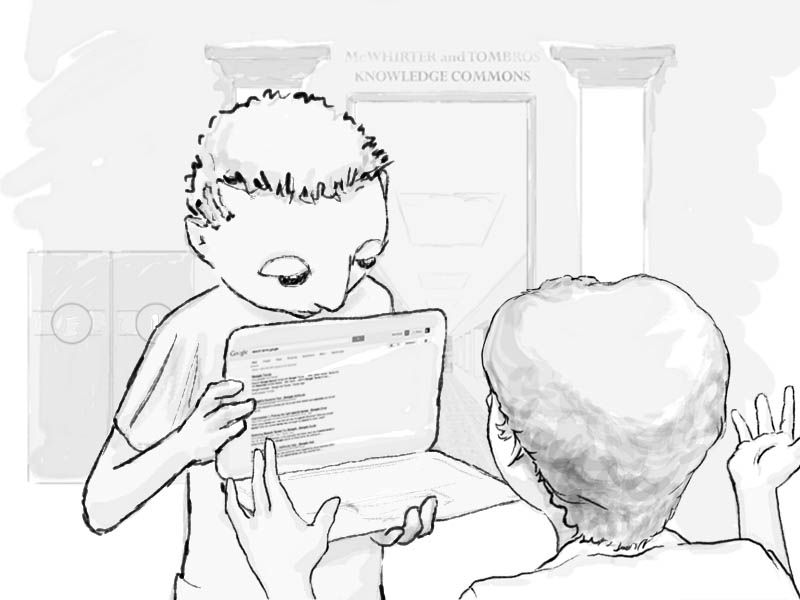 Deena: Well, you saw what I got. 250 entries. And a lot of these don't look like what we want.
Deena: Well, you saw what I got. 250 entries. And a lot of these don't look like what we want.
Brian: I guess we need to add more keywords or something.
Deena: Let's try using Boolean logic. I learned that from reading the help on the Web search engines. It also works for many library search engines. Basically, it is a way of combining word searches to help focus the results on a specific topic while still searching broadly. You can combine keywords using "and," "not," and "or."
Brian: Okay, so when we entered the keyword "experience," the database returned everything that had experience in it, right?
Deena: Right.
Brian: So to narrow things down, I should do a Boolean search.
Deena: Type in the keyword, "experience," and then the word "and," and now the keyword, "freshman." It should read as follows: "experience" and "freshman."
Tip: Different search engines may use different Boolean words or symbols.
For example, Google uses + and - symbols, or you can use their advanced search options; most library databases use the words "AND," "NOT" and "OR." Generally, you can find the correct syntax for the search engine by using the help option.
Boolean - or a Combining - search strategy can be a powerful way to overcome the weaknesses of both standard and keyword searches. This strategy allows you to use operators such as "and," "not," and "or" to search for more than one term at a time and combine the results. This kind of strategy allows you to search broadly while at the same time focusing your results on your specific topic.
- AND requires both terms to occur in the same record. It narrows your search.
- OR lets either term occur in the same or different record. It expands your search.
- NOT excludes records containing the term specified. It narrows your search.
Examples: (see search engine results below):
- fish AND tropical
- fish NOT tropical
- whales OR dolphins AND mammals
- algebra AND calculus
- algebra AND calculus NOT linear
Factoid: Logician George Boole (1815 - 1864) pioneered the study of symbolic logic or mathematical logic. This area of study examines relationships of sets of concepts and has a strong link to retrieving information.
More Savvy Searching Tips:
- Using " " around a phrase to search for the exact phrase.
- Using * as a truncation symbol, e.g., architect* returns results for architecture and architect.
In addition to simple searches, search statements can be combined to be even more restrictive. Here are some examples and the results:
fish AND tropical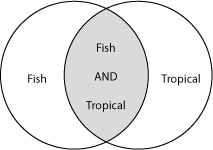
- Lim Chareon Aquarium --Thai Tropical Fish
- Brampton Aquarium Club--Tropical Fish, Meetings, Speakers,
- Breeding Tropical Fish
- Fish's Tropical Paradise
- Welcome to Rardin's Tropical Fish hatchery
fish NOT tropical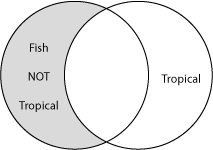
- fish decoy's homepage
- FISH RING. . . .A RING FOR THE FISHERMAN made with SOLID
- The fish bowl
- Red Fish, red drum Louisiana redfish fishing charters for red fish,
- Flightseeing Alaska By Air--Alaska Fly 'N' Fish Charters
(Whales OR dolphins) AND mammals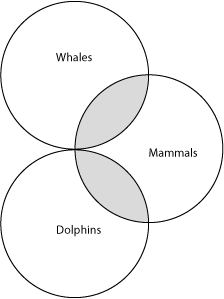
- Dolphins Dolphin Art Marine Mammals Sunsets Ocean Art Hawaii
- Whales and dolphins, marine mammals --gifts and collectibles
- Introduction to Antarctic and Arctic Oceanography --IMCS RUTGERS with Use Ki
- Travel to the Caribbean on a whale watching nature tour to the Silver Bank
algebra AND calculus
- Extended algebra and calculus for 1NF relational databases
- Math Skills--Math, Calculus, Algebra, Trigonometry, Geometry,
- T3 Computer Algebra Enhanced Calculus
- Algebra and Calculus with Maple
- From Algebra to Calculus
algebra AND calculus NOT linear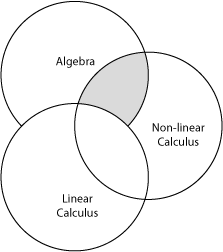
- Algebra and Calculus with Maple
- From Algebra to Calculus
- A REDUCE program for vector algebra and calculus
- infoZine--Interactive Learning Of Algebra Through Calculus
- Higher Viewpoints: Part Two Algebra to Calculus
Activity 2: Searching Strategies
Check to see what you have learned about searching by taking this quiz .

Evaluation Refined
Student Dialog - Refining Your Process

Brian: All right, I was just checking my schedule and I need to get going. So, are we about finished?
Deena: Yeah, I think we've just about covered everything.
Brian: Great! Then I'm leaving.
Deena: Not so fast, Brian. I want to make sure we're all going to use what we've talked about. I think we can refine those preliminary evaluation processes a little. You remember, currency, relevancy, clarity, and authority.
Brian: Yeah, I remember those.
Once you have done a preliminary search, how do you decide what sources, references, citations, etc. do you use? You should examine carefully the content of your sources. If your source is a book, read the preface and introduction in order to analyze the intentions of the author or authors. Check out the index and table of contents to get a sense or overview of what the book covers. Determine if there are chapters that speak directly to your research interest. If the source is a journal, read the abstract or editor's comments.
Remember the categories of Currency, Relevancy, Clarity, and Authority from your preliminary evaluation process? Refining that process leads to a more effective evaluation of potential sources for use in your research. You should develop your own guidelines that work for you as you proceed through higher education, but here are some additional questions that will help you practice evaluating your sources.
Currency
- Is the information in the source current and well researched?
- Are there omissions of certain aspects of your topic such as conflicting points of view?
- Is the coverage of your topic comprehensive?
- Is the source correct for contemporary contexts (Some topics require more currency than others.)?
Relevancy
- Consider the audience of the author. Is the publication aimed at experts, professionals, specialists, or a general audience?
- Does the source cover your topic in depth or marginally?
- Does the source present new information or a different (but supported) point of view?
- Does the text cite the sources it uses in the form of footnotes, references, and bibliographies?
Clarity
- Is the book, article, or journal organized in a logical fashion?
- Is the content presented clearly and logically?
- Are arguments clear and supported or are they contradictory?
- Is the text reasonably easy for you to read?
- Is this source sophisticated enough for your needs or is it overly technical, too advanced, or too elementary?
- Are there grammatical errors, typographical errors, or misspellings?
Authority
- What do you know about the author's credentials, organizations, or affiliations?
- Is this author cited in texts you are currently reading?
- Are there reviews of this book or source? Are reviews negative, positive, or mixed?
- Do the findings of this source corroborate the findings of other credible sources?
- Is the language sober and factual, or glossy, emotional, and inflammatory?
- Are there vague generalizations or sweeping statements made by the author(s)?
- If the source is a journal, is it peer-reviewed (also known as refereed, this means that articles published in the journal have been reviewed and judged acceptable by other experts in the field)?
Activity 3: How to evaluate material?
|
Take this quiz to see if you understand how to evaluate materials.

|
Deena: So, what have we learned?
Brian: I think the most important thing is that if we don't use effective search strategies, we will waste a lot of time sorting through useless information.
Deena: I agree. So, we need to use advanced search strategies. Like defining and refining exactly what we're looking for.
Brian: And using Boolean logic to narrow the kinds of information we get from a search.
Deena: I think we should remember to utilize help - whether it's a human being in the library or the help function in a search engine.
Brian: Good point. Once we have all this information, let's remember to write down the, uh, what was that called?
Deena: Citation.
Brian: That's right, citation.
Deena: That's so we know where we found the information.
Brian: Great! It seems like we've got a pretty good handle on what we have to do.
Deena: I'd like to mention one thing that I think is really important.
Brian: What's that, Deena?
Deena: Well, I think that having the Internet adds more complexity to source evaluation - which is an already complex process. I mean, anyone can publish on the Web without certification of facts or sources. So, we need to be cautious when we're looking at information on a Web page.
Brian: Good point, Deena.
Evaluation Refined - The Tangled Web
Remember, anyone can publish on the Web without verification of facts or sources. Authorship is sometimes unknown, qualifications can be suspect, and responsibility difficult to determine. Goals and purposes of Web pages are also subject to scrutiny as they can act as a public soapbox for disseminating personal or institutional beliefs, opinions, and biases. Alexander and Tate suggest you should first identify the kind of Web page you have found. There are five types of pages you may be considering as sources for your research:
- Advocacy
- Business/Marketing
- News
- Informational
- Personal
Advocacy Web Pages
An Advocacy Web page is one sponsored by an organization attempting to influence public opinion (that is, one trying to sell ideas). The URL address of the page frequently ends in .org (organization).
Examples: National Abortion and Reproductive Rights Action League, The National Right to Life Committee, the Democratic Party, and the Republican Party.
Business/Marketing Web Pages
A Business/Marketing Web Page is one sponsored by a commercial enterprise (usually it is a page that promotes or sells products). The URL address of the page frequently ends in .com (commercial).
Examples: Adobe Systems, Inc., the Coca Cola Company, and numerous other large and small companies using the Web for business purposes.
News Web Pages
A News Web Page has a primary purpose of providing extremely current information. The URL address of the page usually ends in .com (commercial).
Examples: USA Today, Philadelphia Inquirer, CNN.
Informational Web Pages
An Informational Web page is one that purposes to present factual information. The URL address frequently ends in .edu or .gov, as many of these pages are sponsored by educational institutions or government agencies.
"Examples": Dictionaries, thesauri, directories, transportation schedules, calendars of events, statistical data, and other factual information such as reports, presentations of research, or information about a topic.
Personal Home Pages
A Personal home page is a Web page that is published by an individual who may or may not be affiliated with a larger institution. The URL address of the page may have a variety of endings (including .com, .edu, etc.).
Questions to Ask About Web Pages
Criterion #1: AUTHORITY
- Is it clear what organization, company, or individual is sponsoring or responsible for the page?
- Is there a link to a page describing the goals or purpose of the organization? If it is a company, is there a link to a page where you can find out the nature of the company, who owns it, or what its products are?
- Is there a way of verifying legitimacy? That is, is there a phone number or postal address to contact for more information? (An email address is not enough). Is there a way of verifying the legitimacy of an individual? (Because it is difficult to verify the legitimacy of an individual, personal home pages may be a useful source for personal opinion, but use extreme caution when using them as a source for factual information).
- Is there a statement that the content of the page has the official approval of the company or organization?
- If it is an organization, is it clear whether this is a page from the national or local chapter of the organization?
- If it is a company, is there a way to determine the stability of the company?
- Is there a statement giving the organization or company name as copyright holder?
- For news pages:
- Is there a non-Web equivalent version of this material that would provide a way of verifying its legitimacy?
- If the page contains an individual article, do you know who wrote the article and what his or her qualifications are for writing on this topic?
- Is it clear who is ultimately responsible for the content of the material?
- For informational and individual pages:
- Is it clear who wrote the material and are the author's qualifications for writing on this topic clearly stated?
- If the material is protected by copyright, is the name of the copyright holder given?
[top of page]
Criterion #2: ACCURACY
- Are the sources for factual information clearly listed so they can be verified in another source? (If not, the page may still be useful to you as an example of the ideas of the organization, company, etc. but it is not useful as a source of factual information).
- Is the information free of grammatical, spelling, and other typographical errors? (These kinds of errors not only indicate a lack of quality control, but also can produce inaccurate information).
- If the page belongs to a company, does the page provide a link to outside sources such as product reviews or reports filed with the Securities and Exchange Commission that can be used to verify company claims?
- For news pages, are there editors monitoring the accuracy of the information being published?
- For informational pages: is it clear who has the ultimate responsibility for the accuracy of the content of the material?
- If there are charts or graphs containing statistical data, are the charts or graphs clearly labeled and easy to read?
[top of page]
Criterion #3: OBJECTIVITY
- Are the biases of the organization or individual clearly stated?
- If there is any advertising on the page, is it separate from the informational or opinion content?
- Is the company's motivation for the information clear?
- For news pages, are the editorials and opinion pieces clearly labeled?
- For informational pages: is the information provided as a public service?
- Is the information free of advertising?
[top of page]
Criterion #4: CURRENCY
- Are there dates on the page to indicate
- when the page was written, and/or
- when the page was last revised?
[top of page]
Criterion #5: COVERAGE
- Is there an indication that the page has been completed and is not still under construction?
- Is it clear what topics the page intends to address?
- Does the page succeed in addressing these topics or has something significant been left out?
- Is the point of view of the organization or company presented in a clear manner with well supported arguments?
- For a company:
- Does the page include an adequately detailed description of any product?
- Are all of the company's products described with an adequate level of detail?
- Is the same level of information provided for all sections or divisions of the company?
- For news pages:
- Is there a link to an informational page that describes the coverage of the source?
- If you are evaluating a newspaper page and there is a print equivalent, is there an indication of whether the Web coverage is more or less extensive than the print version?
- For informational pages:
- If there is a print equivalent to the Web page, is there a clear indication of whether the entire work is available on the Web?
- If the material is from a work with an expired copyright, has there been an effort to update the material to make it more current?
Useful resource: http://www.sfgate.com/cgi-bin/blogs/rheingold/detail?entry_id=42805
Activity 4: Practice of Source Evaluation
Now take some time to practice evaluating sources.
Note: A downloadable RTF file of this worksheet is included in the left sidebar of this page.
Worksheet: Going Through the Resource Evaluation Process
For this activity, select a research topic about something that would be useful to you or use one that you have been assigned. Follow the process outlined in this module to research your topic. Record your findings and observations as you go.
Start with a preliminary evaluation of background information on your topic. Look for a variety of types of materials from a variety of kinds of resources. Include journal articles, Web sites, books, papers, news articles, etc. in your review. Try several different search engines on the Web, then refine your search using the one that gives you the best results. On the attached worksheet, record information for three of the sources you find.
Choose three sources from the ones you found and evaluate them by answering the questions found in the section of this module called, "The Preliminary Evaluation Process." There may be questions that you don't have enough information to answer yet - just answer the questions you are able to. Remember to keep track of the resources you evaluate, including information for citations - you might need it later when you actually write your paper.
Next refine your research by narrowing down your search from the information you found in your background search. You might find that you need to change your focus depending on the number and kinds of resources you find. You can also narrow your focus by searching just the resources that are most likely to provide information relevant to your topic. To maintain the credibility of your research, you should still try to use information from a variety of publication types and authors as well as those with opposing or contradictory points of view.
As you continue to narrow down and evaluate the resources you find, continue answer the questions about three of your sources from the "Evaluation Refined" section of this tutorial for print materials or the "Questions to Ask About Web Pages" for Internet materials.
Using the notes you made as you answered the evaluation questions, evaluate the quality of the information in each source. Review the arguments from each resource. Then, decide which of the resources you would classify as the most reliable and valuable and why.
Source Evaluation Worksheet
My Topic:
My Research Agenda, Questions, or Objectives:
General Evaluation of Background Information
Source #
Title:
Full citation in appropriate bibliographic reference style (be sure to use the style your instructor has assigned):
My comments on:
Currency -
Relevancy -
Authority -
Clarity -
My Library searching activities (subjects/keywords used, Boolean parameters) were:
My Web searching activities (search engines used, Boolean parameters, "wrong turns") were:
References
Content
For additional information on source access and evaluation, please consult the following references:
- American Psychological Association. (2017). Publication Manual of the American Psychological Association, Sixth Edition. Retrieved July 11, 2017, from http://www.apastyle.org/manual/index.aspx.
- Askjeeves, Inc. (1996). Ask Jeeves. Retrieved July 11, 2017, from http://www.ask.com/.
- Alexander, J., & Tate, M. (1996). The Web as a Research Tool: Evaluation Techniques. Retrieved August 10, 2011, from http://www.media-awareness.ca/english/resources/educational/teaching_backgrounders/internet/web_as_research_tool.cfm.
- Google, Inc. (1998). Google. Retrieved August 10, 2011 from http://www.google.com/.
- InfoSpace, Inc. (1994). MetaCrawler. Retrieved July 11, 2017, from http://www.metacrawler.com/.
- New Mexico State University (2017). Understanding & Evaluating Resources. Retrieved July 11, 2017, from http://nmsu.libguides.com/sources.
- SurfWax, Inc. (1998). SurfWax. Retrieved August 10, 2011, from http://www.surfwax.com.
- Tillman, H. N. (2003). Evaluating Quality on the Net. Retrieved July 11, 2017, from http://hopetillman.com/hopewp/findqual/
- The University of Chicago. (2017). The Chicago manual of style. Retrieved August 10, 2011, from http://www.chicagomanualofstyle.org.
* Indicates that the original Website is no longer available.
Summary
Accessing information is a complex process. One must learn methods for rapid, accurate retrieval of information, as well as acquire the ability to differentiate between valid and invalid sources of retrieved information.
In general source evaluation, one examines a piece of information as it is acquired and makes an immediate determination as to the appropriateness of the information. If the information is not appropriate for the task at hand, it is discarded.
Refined source evaluation occurs after one has acquired several pieces of seemingly valid information. The different pieces of information are sorted and classified according to quality and relevance.
The other sections in this tutorial deal with the utilization of two informational sources - the World Wide Web and the library. Basic methods for utilizing these sources of information were introduced.
Instructor's Guide
Quizzes, Reflective Questions and Activities
Following are the assignments embedded in the Source Evaluation and Search Strategies tutorial:
Activity 1: Quiz
Activity 2: Quiz
Activity 3: Quiz
Activity 4: Evaluate sources - handout
Relationship to Other iStudy Tutorials
This tutorial is somewhat related to and dependent on other iStudy tutorials on personal effectiveness, including note taking, active listening, active reading, time management, planning your time, and conducting an interview.
Therefore, it is recommended that instructors introduce this tutorial to students after the other personal effectiveness tutorials because the personal effectiveness tutorials are in some ways prerequisite to this tutorial.
Suggested In-class Methods of Presentation
Lecture
- Explain the purpose/intent of the session. Refer to the Purpose section for more detail.
- Explain general information about search strategies and evaluation, including use of the web and libraries. Also discuss search strategies.
Discussion
- Provide several topics and discuss how to go about searching for information on them. Instructors should provide several examples, and invite students to cite some examples as well.
- Break the students up into small (four-five people) groups. Provide each group with a topic, perhaps a current social issue. Each group should work with the provided topic to develop search strategies for that topic. If the discussion takes place in a computer lab, students can actually perform these search strategies and develop a list of references they can share with the class. Instructors can assess students' understanding of search strategies at this point by observing how each group presents its findings and responds to questioning.
Note : This is an excellent opportunity to utilize and reinforce the cooperative learning techniques from the iStudy Cooperative Learning tutorial.
Key Points
These points are covered in the iStudy tutorial, but should be emphasized in any discussions.
- General source evaluation.
- Use of the library.
- Use of the web.
- Search strategies.
- Refined evaluation.
Assessment Criteria
Through observing both the group's and the individual's activity, the instructor may assess student performance. Assessment criteria are as follows (Instructors provide the percentage weights):
Assessment Criteria
|
Where
|
Domain
|
Activities
|
%
|
|
iStudy Tutorial
|
Knowledge
|
The student can identify different types of sources and their appropriateness by listing them.
|
|
|
iStudy Tutorial
|
Comprehension
|
The student can formulate questions to help evaluate sources.
|
|
|
In-class
|
Application
|
The student can locate information/source by suing search strategies.
|
|
|
iStudy Tutorial
|
Synthesis
|
The student can evaluate the quality of sources by applying criteria.
|
|
|
|
|
|
100%
|
 Many of us are inclined to accept all sources of information as valid and reliable. Some people would call this being gullible or easily swayed. Others would say that some kind of source evaluation is required before accepting premises or ideas. In college, as well as work and "real life," some sources are more appropriate than others.
Many of us are inclined to accept all sources of information as valid and reliable. Some people would call this being gullible or easily swayed. Others would say that some kind of source evaluation is required before accepting premises or ideas. In college, as well as work and "real life," some sources are more appropriate than others.








 Brian: Okay. I understand that I need to start by writing down some questions I want to find answers to and by searching for background information. Then, I need to carefully evaluate the information I find to figure out if it will be good to use in my paper. But, I still don't understand how to start searching. How do I go about finding sources at the library?
Brian: Okay. I understand that I need to start by writing down some questions I want to find answers to and by searching for background information. Then, I need to carefully evaluate the information I find to figure out if it will be good to use in my paper. But, I still don't understand how to start searching. How do I go about finding sources at the library? Deena: I usually get more information than I need when searching the Web. And I often have to work through a number of sites before I find one that I would want to use for a research paper. We should probably keep that in mind when searching the library for materials, too. There is a way around the problem of broad searches though.
Deena: I usually get more information than I need when searching the Web. And I often have to work through a number of sites before I find one that I would want to use for a research paper. We should probably keep that in mind when searching the library for materials, too. There is a way around the problem of broad searches though. Deena: Well, you saw what I got. 250 entries. And a lot of these don't look like what we want.
Deena: Well, you saw what I got. 250 entries. And a lot of these don't look like what we want.


